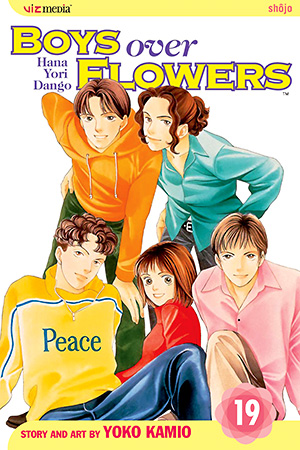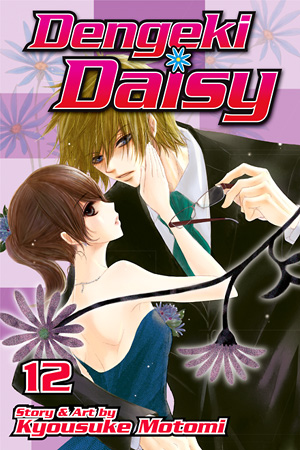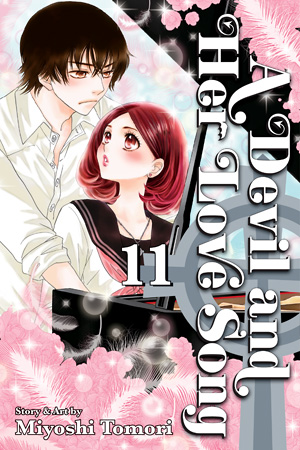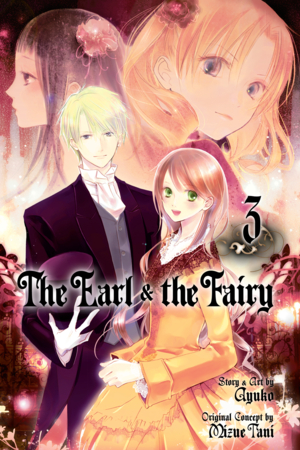This Week
Boys Over Flowers vol. 19
Dengeki Daisy vol. 12
A Devil and Her Love Song vol. 11
The Earl and the Fairy vol. 3
Flower in a Storm vol. 2
Where’s the josei?
It’s time to answer yet another question absolutely nobody has asked!
As I go through the Shojo Beat catalog (which has many good titles I’m looking forward to reading), there’s been a few that I’ve skipped even though they are available. I chose not to cover series like Crown of Love and Everyone’s Getting Married, nor will I be reading Nana or Honey and Clover. These are all great series that I enjoy, but they’re josei rather than shoujo, i.e. series aimed at an adult female audience rather than a teenage audience.
I avoid covering josei for a couple reasons. One is that, well, I’m less concerned about the tastes of adults. Yes, we continue to be impressionable for our entire lives, and toxic attitudes that permeate media aimed at us continue to affect our perceptions of the world. However, we are less impressionable, and often have perspective on things that a lot of teens lack. I have enough experience that I can easily identify unhealthy relationships in fiction, and have developed the mindfulness to stop and ask why certain images have certain effects on me. I have certain tropes that I like, and not all of them are realistic or would be healthy in reality, and I can recognize that because I’ve learned to draw a line between reality and fantasy. I don’t want to police other women’s engagement with similar tropes.
The other reason is that the best josei has a much more nuanced approach to abuse and consent than your average shoujo series. Take Nana, for example – one of the main relationships depicts abuse realistically. The narrative doesn’t romanticize it, and even calls marital rape out for exactly what it is, but also recognizes the complicating factor of the feelings involved. Everyone’s Getting Married portrays two people who love each other but want different things out of their relationship in an even-handed way that examines both perspectives.

Boys Over Flowers vol. 19
When Tsukushi is left homeless, she has no choice but to become a maid in the mansion of her on-and-off boyfriend, Tsukasa. Not only that, but she becomes his own personal maid! Her duties include the dreaded task of waking him up in the morning, a job normally left to three people. Then Tsukasa orders her to come to his room unseen at midnight, causing Tsukushi to panic. Will this pull them closer together or push them further apart?! (summary by Viz)
13 points
Talk about power imbalances! Now, not only does Domyoji have financial and social power over Tsukushi, but he’s her employer with the power to withhold food, housing, and money from her. Kamio actually does engage with the potential for abuse in this situation, but disappointingly brushes it off. When Domyoji tells her to come to his room at midnight or he’ll come find her – of course she has no way of locking him out or protecting herself – Tsukushi’s main reaction is of fear. She even starts crying when the time comes. This is only natural, since he’s shown a shocking lack of respect for her decisions and her autonomy throughout the series, and already tried to rape her once. Tsukushi is aware of and frightened of the power he holds over her, aware that if she were to try to refuse sex he could easily overpower her, leave her homeless, or otherwise destroy her life. This is not natural. This is not okay.
Even though his plans were actually pretty sweet, the power struggle resumes when sex comes up. When she tells him to stop, he says, “No” and restrains her so she can’t struggle. Most insultingly, it mirrors the scene early in the manga when he attacked her in the school, including Tsukushi’s inner monologue about how gentle his kiss is and how she can’t bring herself to say no. She does reassert herself and demand that he respect her wishes to take things at a slower pace, but it’s just too little too late.
Of course, the two do decide to try dating in the volume. It could be a case of quirky translation, but Tsukushi tells him, “I’ll be at your mercy.” It’s not cute or funny, because it’s too close to the truth. Her friend Yuki tells her that if he’s not willing to compromise, then he’s not worth it, which is good advice that he feels totally exempt from. He insults her when she suggests they go to an amusement park, asking why he should “lower [himself] to her level. Even though he does go, that doesn’t make the outright statement that she’s beneath him okay, and he’s a total crank the entire time they’re there. You can’t build a lasting partnership with someone who’s disrespectful to your background like that, and arrogant people make terrible partners. There is simply no way for them to have a healthy relationship.

Dengeki Daisy vol. 12
Teru and her friends sneak aboard a yacht in order to save Rena and foil Morizono’s plan to sell the new “Jack Frost” virus. The rescue mission turns out to be more than anyone bargained for, however, when Kurosaki runs into a man who makes his blood turn cold… (summary by Viz)
3 points
This volume is actually pretty mild, but it did contribute to an addition to the spreadsheet: “controlling wardrobe”. It’s not one I’ve really noticed come up so far, but Dengeki Daisy has had occasional hints of it. Kurosaki has commented on how much of her body Teru can reveal before – there was a one-off gag about how he doesn’t like it when she exposes her bellybutton. This time, she wears a very pretty strapless dress to Rena’s “engagement party” and confronts Miyazono in it. He, in highly predictable shoujo villain fashion, sexually threatens her just before Kurosaki arrives and rescues her. After the fight, Kurosaki embraces Teru and tells her, “No more dresses like this… unless you wear a t-shirt and wool shorts underneath.”
Although their relationship has largely settled into a comfortable pattern other than the annoying age gap issue, there’s an uncomfortable hint of paternalism to Kurosaki commenting on how much of her body Teru is allowed to expose. This strategy for controlling women’s bodies and sexuality goes back millennia, and is ever-present in everyday life. At best, it’s petty jealousy and controllingness; Kurosaki doesn’t want anyone to see Teru’s body because he’s the only one with any right to it. However, in these cases, it comes across more as him wanting to protect her chastity, both from himself and from other men. Men making demands to what their partners wear is actually a very common sign of abuse – dressing too sexy or not sexy enough, wearing makeup, even hairstyle and color. It’s coercive control, not allowing women to make their own decisions or control their own lives. Kurosaki doesn’t own Teru’s body and he’s not in charge of her virginity. That’s up to her.

A Devil and Her Love Song vol. 11
Maria finally gets to be with her beloved Shin, but her mysterious inability to speak continues to haunt her. Because the cause may be related to her past, she decides to go to Yokosuka, the town she grew up in. What life-changing surprises await her there? (summary by Viz)
2 points
Last week, A Devil and Her Love Song infuriated me when Shin nearly raped Maria. This next volume has left me with much more complicated, mixed feelings about the whole series. Shin apologizes sincerely to Maria, acknowledging how what he did was wrong and promising to never cross that boundary again. It’s a good apology, full of genuine remorse, and it leads to an unambiguously consensual scene of physical intimacy.
You see, this volume tackles the issue of repentance, reformation, and forgiveness, which is a subject that requires a great deal of sensitivity, especially when connected to sexual assault. On top of her issues with Shin, she meets her father – the man who kidnapped and raped her mother when she was only 14 and shattered her psyche. She despises him, but when she finds that he’s a changed man – a priest who runs an orphanage and cared for Maria from a distance after her mother died – Shintaro asks her to forgive him. Narratively, he’s depicted as a gentle, clumsy man who changed because he fell in love with his victim and only wanted to care for their daughter from afar. The volume ends with Maria deciding to forgive him, and they sing “Amazing Grace” together.
There’s a lot to unpack here. Forgiveness is a very personal thing, and it’s up to the one wronged to decide whether or not to offer it. I never want to deny anyone the choice to forgive and to move on. However, Maria is a fictional character, not a real person, and so her choices are subject to greater scrutiny. The series never truly addresses the level of damage that John did; Anna Mouri is dead because of his actions. She never saw justice, because her family chose to take the US government’s money, and struggled alone and in poverty to raise a toddler when she herself was still a child. Shintaro is way out of line taking Maria to meet him without properly preparing her first, and the whole thing smacks of emotional manipulation. He even tells her not to hit him! Survivors like Maria should be free to express their anger, without anyone telling them the right or wrong way to experience it. A Devil and Her Love Song tries to tackle a nuanced topic, but falls short.

The Earl and the Fairy vol. 3
Lydia and Edgar have returned to London after their adventure on the Isle of Manan. But life in the capital is no respite for the weary travelers. A being called the Fogman stalks the night streets, snatching children all around town. And it may have something to do with Edgar’s dark past… (summary by Viz)
4 points
Lydia is still wary of Edgar, and for good reason. I rather like that he has to win her trust rather than her falling all over herself once she finds out about his tragic past. She has a good head on her shoulders, and instead of being swept away by Edgar’s protective behavior or submitting after nominal protestations, she stands up for herself. When he has Raven follow her without letting her know, she lets him know how uncomfortable it makes her and doesn’t give in to his explanation that he was just acting as a bodyguard. Nor does she want to be spoiled or treated like a lady with Edgar’s wealth; she just wants to do her job and be treated with respect.
Not that any of that means she doesn’t like him, because clearly she does. When another girl starts trying to flirt with Edgar, Lydia gets jealous. And Edgar is into her as well. But there’s no apologism for when he violates her boundaries; it’s up to him to figure out what is and is not acceptable. When she receives flowers from another man, he grumbles but doesn’t fly into a jealous rage or turn to passive-aggressive sniping. The Earl and the Fairy understands that in order for a romance to work, all participants need to develop a mutual understanding and respect for each other’s boundaries.

Flower in a Storm vol. 2
Ran’s romantic overtures are starting to work on Riko–but the ordinary life she’s yearned for is not in the picture. A hotel heiress claiming to be Ran’s fiancée is just the beginning of another dangerous storm of trouble…(summary by Viz)
6 points
Yeah, that fiancee hangs around for exactly one chapter, declares she loves Ran because he’s rich, and disappears promptly, never to be seen or heard from again. Because that’s the level of storytelling in Flower in a Storm.
With Riko reciprocating Ran’s feelings, thus him having no reason to stalk and harass her, there’s much fewer points this time around. In fact, some of the points came from Riko’s side as she blows hot and cold, often refusing to listen to Ran’s explanations or consider his feelings. While it’s more common for male partners, girls have just as much capacity to be abusive. Since Riko is the POV character, we can see from her inner monologue that her pattern of emotional withdrawal isn’t about having power over Ran, so it’s not strictly abuse, but it’s still a deeply unhealthy dynamic. Not nearly so bad as Ran obsessively stalking her and declaring his ownership of her, of course. I don’t want to diminish that. Their relationship is poisoned from the start.
She may get to save him in the finale, but that still can’t save the series.
Series total: 21 points
Average per volume: 10.5
Tropes: 3
Physical abuse: 0
Sexual abuse: 7
Emotional/Psychological: 10
Most common:
- Touching without consent
- Stalking
I’m very, very glad that Flower in a Storm is so short, because I’m pretty sure I would lose my goddamn mind if it were much longer. The series has a manic, even frantic energy, where nothing has a moment to breathe and there’s little consistent internal logic.
I understand it’s a comedy, and there are some comedies with that kind of pacing that work. However, Flower in a Storm just isn’t one of them. The cast is unlikeable, their romance is a solid as a house of cards, Ran is creepily entitled, and the jokes just aren’t funny. It’s a shame, because there are grains of a good story here! Riko learning to accept and value her own super strength and getting a chance to save the day would make for a compelling read if it weren’t shrouded behind 20 layers of unfunny jokes and creepy romance. Takagi isn’t an untalented storyteller; the short stories included at the end of each volume display sensitive treatments of difficult subjects and compelling characters in just a few pages.
Next Week
Boys Over Flowers vol. 20
Dengeki Daisy vol. 13
A Devil and Her Love Song vol. 12
The Earl and the Fairy vol. 4 (conclusion!)
Gaba Kawa

I wonder what you think of Anata to Scandal. Usually I try to be patient with shoujo heroines as I know that they are young and naïve which can teach young girls that a mistake isn’t the end of the world which it’s often treated as in western media I’m used to.
But Tomoka… The heroine… She’s outright horrible. She verbally abuses her love interest and constantly wants them to be different which clearly hurts them. Every relationship in the darn thing has warning lights, like one guy is threatening to harm himself if the girl he likes doesn’t date him! The only likeable character is the sorta-kinda villain because she’s the only one feeling human, the others are too “perfect”, abusive, former bullies, or manipulative… Heck, the author’s thoughts on lesbians and bisexuals are “someone that chooses to live dangerously” what even… I really want to see someone else’s thoughts on it! Especially yours!
LikeLike
Flipping Flower in a storm can go burn. I was so disgusted by the first volume. How dare her friends find it funny when he locks her in a room with him and threatens her? I chucked that and it’s sequel into the bin without a second glance. Dengeki Daisy is so beloved and I can’t get a feel for it. The age gap is creepy, the story telling is everywhere and the mangaka even said it was supposed to only be a oneshot. It shows. HYD is HYD….
As much as I loved Kamisama Kiss holy crap are there problems in it and I’d love to see your thoughts on it if you get around to it. The manga does some great things but then it also does some things that had me extremely uncomfortable.
LikeLike
Kamisama Kiss is upcoming in a few weeks! I’ve read the whole thing and I generally like it, but it’s… flawed.
LikeLiked by 1 person
Oh that’s awesome to hear! Yeah, it’s enjoyable enough but the more it went on the more I started to grow uncomfortable with the content in it. Nanami was so strong at the beginning and while some of the time travel arc presented that strength, she became a very diff character at the end of the series a shame
a shame
LikeLike